Concerned about the poor coverage of news and activities in Taraba State in the national media when he was there for national youth service in 2011/12, Ayodele Samuel, a graduate from the Nigeria Institute of Journalism (NIJ), Lagos started writing about the state on social media and other platforms. In 2016, he launched the Taraba Truth & Facts Newspaper and in April, this year, he became the founder of the first private radio station in the state, Rock FM 92.3
In this interview with Media Career Development Network by Lekan Otufodunrin, Esther Adeniyi and Eniife Itohan Ezekiel, the media entrepreneur shares his experience managing media business and insights on how to excel in the profession.
What’s your reaction to the recent threat by the National Broadcasting Corporation (NBC) to shut down some radio stations over non-payment of license renewal fees?
NBC is right because they’re demanding a legitimate payment, but the economy of our country has not been favourable to media owners. At this time, diesel is about N900 plus per litre, and we need to power our equipment with diesel. The cost of travel, the cost of FOREX to get equipment and other costs of running a media house are extremely costly for media owners.
Most media organizations are finding it difficult to meet up with the financial demands of the industry. So, my first reaction to it was that NBC was too much in a haste to take that decision, even though I’m aware that there have been a series of negotiations ongoing.
Some of the debts are said to have dated back to 2015.
Yes. However, as a regulatory agency in the industry, they need to also look at issues from our own side. Media organizations are going through a lot and there should be some concessions.
The payment fee should either be reduced or the years of the fee be extended. Paying N5 m, N15 m for the first five years of broadcasting in this country, how do you make the money? For example, N15 m in the first five years could be extended to 10 years.
Do they really need to renew the licenses?
NBC is not there to make money, it is there to regulate, and I think we need to go to the National Assembly to look into the functions of the commission. It should be a one-off licensing thing. If I pay N15 million now and you regulate me, but now we are being expected to pay every five years.
We are also carrying out a lot of official responsibilities. A lot of adverts from the police, from the DSS, sensitization programmes on governmental policies and others are done free of charge.
Though we are a private organization, these things should be factored into it. If I won’t collect money from the DSS for running an advert on my radio station, or from the Nigerian Army in pushing out what they are doing, and they are part of the government, but the government will collect money from me.
So these are issues that stakeholders must look at and come to the table to discuss. But NBC needs to be friendlier. I won’t want to say they are not friendly, but they could still be more lenient with us.
Some have paid, what happened to those who have not paid?
For those who have paid, I can say most of them would have made the payments through their nose, probably just to avoid this embarrassment. The list used to be about 200. It is still choking on the media sector, especially the big ones. The African Independent Television [AIT] for instance, has radio stations in many states of this federation, you can now trickle down what their expenditure would be like. Silverbird has across the country too. It’s difficult at this time. The adverts are not coming in. Social media is there, it’s taking a bulk of what the traditional media used to get before now in terms of advertising. So the money is not coming in as it is. And what is the value of the Naira? To buy the equipment you have to buy your Forex from black markets.
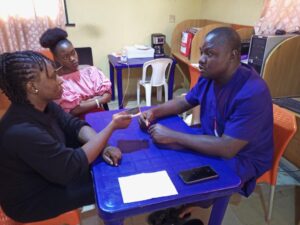
How easy is it to run a radio station under the present economic station?
I’m a new entrant to the industry. I’ve been a practising journalist, and I own a newspaper outfit, but it’s totally two different things. My radio station is barely five months old and it has been a roller coaster experience.
I’m not seeing the smiling side at this time. It’s not easy because you need to run always on diesel. In fact, sometimes, some people will call and we will say, don’t give us money, just bring us diesel. Diesel is the major challenge because as of today it is sold for almost N900 per litre and I could remember that when I was doing my feasibility studies and preparation, the highest I pegged the diesel was N300.
Then the issue of staffing is cumbersome. Now we run from 6:00 am to 11:00 pm daily. We have the capacity to do 24 hours, but we also have to look at our staff security as the insecurity in the country is affecting a lot of things.
Apparently, we are the first private radio station in Taraba state. So there was a gap we needed to fill up and we are filling it. We are trying in our own little way even, but it’s not easy.
Managing a radio station in these five months is more challenging than almost five years of running a newspaper basically because of the economy.
What prompted your decision to own a radio station in a place like Taraba?
I am from Ondo state but was born and raised in Lagos, I actually went to Taraba for my national youth service around 2011/2012. Taraba is an under-reported state. Looking at national dailies you hardly see stories on Taraba except it’s on the bad side. And there were a lot of good stories in the state. Taraba state is a fantastic place.
Getting there, I had the intention of redeploying back to Lagos because I had a job and I was doing fine. But I decided to stay back for three months and do some stories. Around that time, there was this Water and Sanitation Programme (WASH). I was doing a lot of water and sanitation stories, and I was making cool money. My three months extended to six months. I was serving at the NYSC secretariat and I was more like a media officer to the state coordinator. The activities kept me engaged and I was unable to consider the option of redeploying back to Lagos.
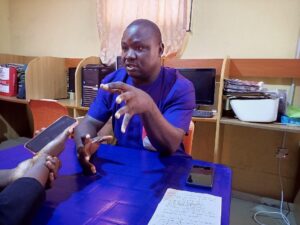
That pushed me to want to focus on reporting Taraba state more. I could remember, at times when I send stories from Taraba state, my editor would not want to take it, probably because he does not really have much interest. So I started posting these stories on my personal social media page and people were following them and that was around 2013-2015. I would just write stories on Taraba and put them on my Facebook page and some other platforms. Around 2016, I decided to try something new and I started Taraba Truth and Facts Newspaper. I spoke with many stakeholders in the state to invest and they said, no, our people don’t read.
So I started with about N2,000 as a digital newspaper. I started the newspaper on my dining table and we produced. It used to be a two-page, just a front page newsletter, then later we started increasing the pages.
From there it bloomed and then we started to print. Our first print edition was in 2018 when we printed 700 copies and it was sold out. At a time we were running a print run of 2,500 and we were selling.
It might not be the first private newspaper in the state, but it was that time as it is today very influential and commands a lot of respect.
So from there, it was time to move on to try new things. I like doing new things. The radio station thing came up and there was no radio station in Jalingo and in the whole state. The residents have started calling on their politicians, on their big men to come and invest in a radio station for them.
I was also pushing the idea to a lot of them, but they were not forthcoming and the cost of setting up a radio station is extremely scary. I decided to take it up. I applied for a broadcast license and I was so fortunate to meet some good people at NBC who put me through how to go about it and I got the license.
For how much?
It’s after you have been issued approval for a license that you pay the license fee. So the whole process then cost me over N18m for the license only, but God was very gracious to me.
I met a lady through which I met her father, an Engineer to discuss his reservations that his daughter, a Mass Communication graduate should work with me. It was this man who opened my eyes to the idea of co-hosting with an existing broadcasting house in Taraba.
The license came out miraculously because a lot of people had been applying for a license for so many years.
I started raising money, talking to people and trying to bring a lot of people to come and invest in the business and people were not really trying to key into it. In fact, I had almost given up but for divine intervention. I was able to pull up resources together with the help of God.
A man who is from Taraba state and would not like his name to be mentioned said why he is giving me some money is because he could see the passion, and that though I am not from Taraba state, he could see the quality report we had been doing in Taraba Truth and Facts Newspaper, and ‘strongly believe if we were supported then he was sure that we can do better in the radio station. Like him, a few friends whom I may not be able to mention their names really came up to support me as they gave me their own token of support. I also took bank loans and sold some properties in Lagos.
That was how I was able to pay and secure the license. So it was extremely challenging, but thank God we scaling through.
On April 22, we had our first broadcast on the station and the reception was massive. At the moment we are covering about 80% of Taraba state, mind you Taraba is the third largest state in Nigeria. They are getting our broadcast signals as far as part of Jigawa state, part of Kano, part of Bauchi, part of Gombe, part of Adamawa, and part of Plateau.
READ ALSO: ‘How I got my radio job without training, experience’
Shouldn’t the state government have been interested to support you?
There is this crisis of identity. It’s easier for some of them to say I’m not from Taraba state. Yes, they are very good people, but at the same time, the political elites are weary of that today. We don’t have any support from the government, not even a commendation later and they want coverage. They don’t want you to speak ill of their government even if they are doing any bad thing, but we have been fair in our reportage, our duty is to give voice to the people.
But the people accepted the station right from the beginning. In fact, they literally took ownership of the radio station because of the quality of content we have. However, it’s the reality on the ground that is critical to know how to communicate with people. They need us because we are literally the most influential brand at this moment in the state, both the radio station and the newspaper.
By and large, your station is doing well
The station is not doing badly in some areas, but financially, we are seriously constrained. We are struggling.
The feedback from the audience is massive. We’ve focused more on uniting and promoting peace and effective cultural integration. People find it very surprising to note that the radio station is owned by a Christian, but every time it is time for Muslim prayers, we do a roll call to prayer free of charge. We also run Christian morning devotion and that is promoting religious harmony in the state, recently the state inter-faith group wrote a letter commending us for that.
So this is just our own little contribution to unite our people and to show them that both Christians and Muslims can live together harmoniously, can co-habit in the same space. We promote virtually all ethnic tribes in the state.
Based on your own experience, what advice will you give to anyone who is planning to set up a radio station?
It’s procedural. Try and follow the due process. Get your documents in parts. Be prayerful because a license has to be signed by the President of the Federation and this takes a lot of time to get it signed.
You have to get your equipment right. Get proven experts on the job. While setting up my radio station, I visited over 20 radio stations across this country asking questions.
Some people will say for someone of your age, you seem to have been very lucky, or that you have moved very fast. Do you agree?
By the grace of God, I agree. There’s grace. Most times I used to tell people that it’s also about hard work. I started journalism at the age of fifteen and in all those years I’ve worked in several media houses.
So there’s the grace of God, but there is also the place of hard work.
From your own experience, what is your advice for young persons who want to excel in the profession?
From my own experience, hard work. It is good to be ambitious, but do it legitimately and put everything in the hands of God, let God be your guide.
If I had not gone to serve in Taraba state, probably there would not have been anything called Rock FM, or Taraba Truth and Facts.
I would have progressed in life, or by now be a line editor or a title editor because at a point in life my dream was to become a title editor before I am 35.
The likes of Toyosi Ogunseye were a good inspiration to us that if she can become an editor when she did, nothing will stop us.
The Young Journalist Award by Journalists for Christ too really prepared us to see that as a young person, we can excel in the profession.
Let’s put our plans in God’s hands. There is no space we are that we cannot excel. There’s no beat we are covering that is not important.
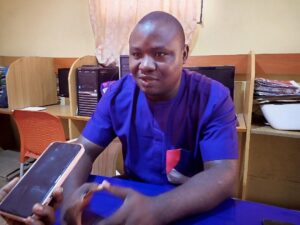
What has been your experience in hiring people and what should the average job seeker be conscious of?
Three questions. What have you done before? What are you doing? What can you do?
The challenge really is that most job seekers don’t have relevant work experience. When they ask you for experience, they are not saying you should go and steal experience.
If you went to any higher institution, especially in our industry, you would have gone for SIWES or Internships. They want to see what you did during that period.
Having experience as far as I’m concerned, is more important than your degree.
I’ve seen a lot of people who come with good certificates, and a good class of degree and they cannot do the job required.
You have gone through a journalism school and now running a media house. Do you see any disconnect? How can we ensure that the training schools prepare graduates better for the industry?
There’s a huge disconnect. Most schools are not teaching practical skills as they used to be. Lecturers don’t really understand what is happening on the field. There is too much theory and less practical.
We want these people to have more practical skills. It can be embarrassing to see Journalism graduates, Mass Communication graduates that cannot easily write simple news stories.
In news writing, what they’re teaching at the school is fine, but we should invest more to teach practical.
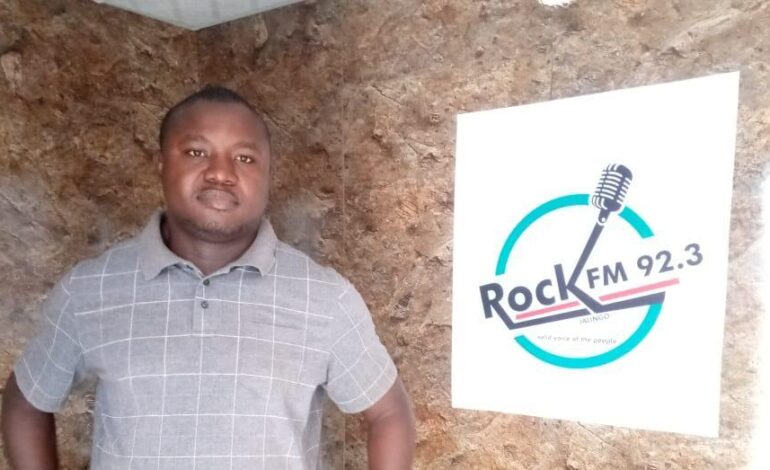
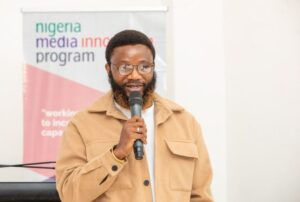

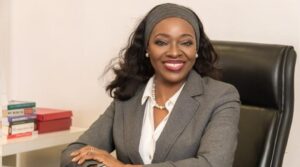
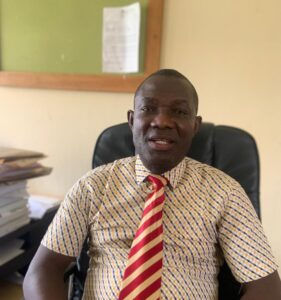
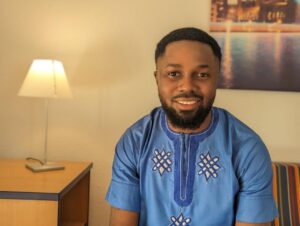
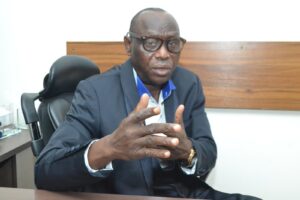
Julius Adegunna
Congratulations Ayo. It’s always good to exploit opportunities. I thank God for your determination to succeed. But you did not say you were born into journalism, broadcasting specifically. Omo Baba Oloye of Owo Made. Cheers.